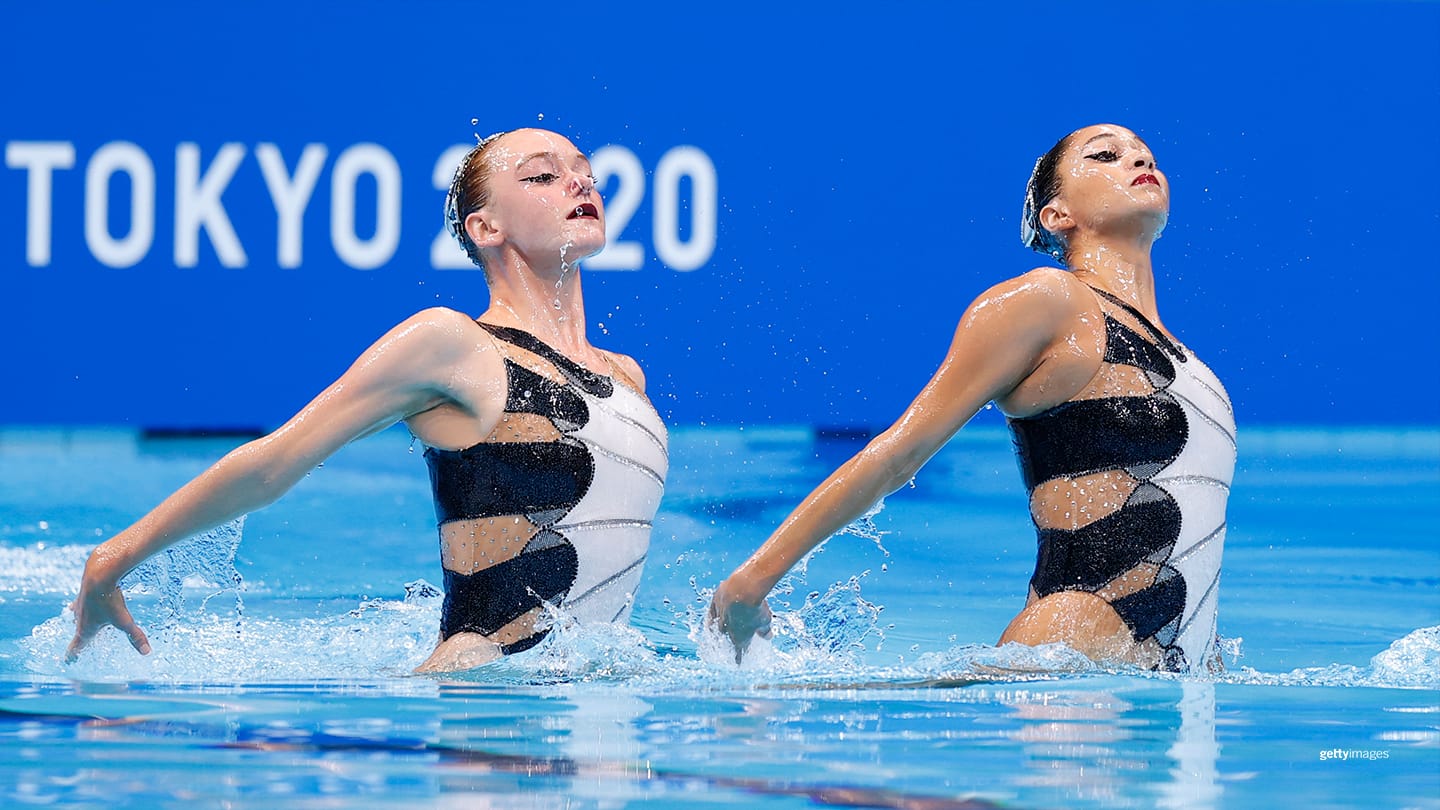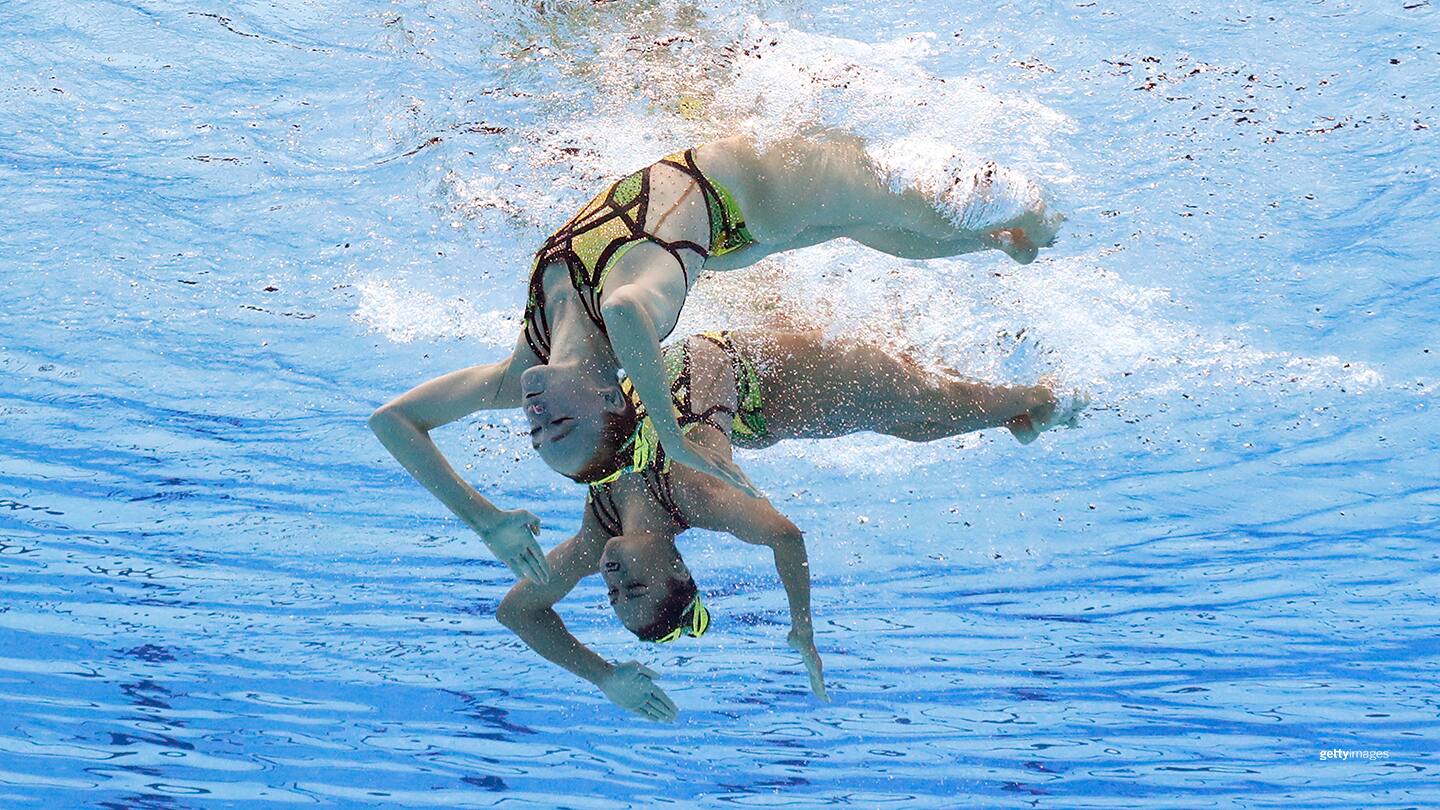
Anita Alvarez & Lindi Schroeder Miss Artistic Swimming Duet Final
by Peggy Shinn

Anita Alvarez and Lindi Schroeder compete in the artistic swimming duet technical routine at the Olympic Games Tokyo 2020 on Aug. 3, 2021 in Tokyo.
TOKYO — Anita Alvarez and Lindi Schroeder came to the Olympic Games Tokyo 2020 excited to represent Team USA in artistic swimming — the sport known as synchronized swimming until 2017.
In a competitive field, they missed qualifying for the duet final by less than one point. The Americans finished 13th behind Mexico, and only the top 12 moved on.
“I think we're happy with the way we swam today,” said Alvarez after their technical routine. “We wanted to make a change from yesterday and the way that we performed and that we personally felt doing the routine, not just the scores reflected but how we were able to enjoy the routine, we were able to perform.”
In the final free performance, four-time Olympian Svetlana Romashina and her new partner Svetlana Kolesnichenko from the Russian Olympic Committee performed a spider-themed duet and claimed the gold medal with a huge score of 195.9079. It was Romashina’s sixth Olympic gold medal.
Huang Xuechen and Sun Wenyan of China won the silver medal with a snake-inspired routine (192.4499), and the Ukrainian duet of Marta Fiedina and Anastasiya Savchuk took the bronze (189.4620).
The Americans were torn up about not making the final. A two-time Olympian, Alvarez finished ninth in the duet with Mariya Koroleva at the Olympic Games Rio 2016; Koroleva has since retired.
Although both Alvarez and Schroeder are artistic swimming veterans, the two are a young team, having paired for the duet in 2018. (Synchronized swimming became known as artistic swimming because synchronization is only part of each routine.)
Alvarez, 24, is from Tonawanda, New York, and her mother, Karen, competed in the 1984 U.S. Olympic Trials in synchronized swimming and now coaches. Alvarez began the sport at age 5 and was competing at age 9. She is now a senior member of the U.S.’s artistic swimming national team.
Schroeder, 19, is from Andover, Massachusetts, and discovered synchronized swimming after she tired of swim lessons. Her parents still wanted to ensure that their young daughter was comfortable in the water. So they enrolled her in a synchronized swimming novice program hoping that she would like it better than traditional lessons. She did, and soon began competing, making the national team at the 11-12 (age) level. In 2016, Schroeder was a junior world champion finalist. Two years later, she moved to northern California to train with the senior national team.
Both Alvarez and Schroeder are Pan American Games Lima 2019 bronze medalists, Alvarez in the duet and team events, Schroeder in team artistic swimming.
In May 2020, both women gained publicity for artistic swimming on “The Voice,” a TV talent show. Alvarez and Schroeder helped singer John Legend, a coach on The Voice, try artistic swimming.
When the pandemic hit, the artistic swimmers trained in backyard pools. Then the air quality caused by California forest fires hampered their training. Coming up for air only occasionally, artistic swimmers need lung-fuls of clean air when they have the opportunity to breathe.
When competition resumed, the U.S. artistic swimmers were focused on qualifying for the Tokyo Games.
Artistic swimming competition has become fierce since the Rio Games. The U.S. has not qualified a full team of nine since the Olympic Games Beijing 2008 (only 10 teams qualify for the Olympic Games).

Ruby Remati, Anita Alvarez and Lindi Schroeder after competing in the FINA Artistic Swimming World Series Super Final 2021 on June 13, 2021 in Barcelona.
In the final Olympic qualifier in Barcelona in June, the U.S. team missed qualification by 0.2 of a point. A few minutes later, Alvarez and Schroeder performed their free routine. Their goal was to qualify for the Tokyo Games as a duet.
It was Alvarez’s fourth event in three days, and she was upset that the entire team had missed qualifying for Tokyo. At the end of the free routine, she lost consciousness.
Coach Andrea Fuentes dove into the pool and helped Schroeder bring her partner to safety. Alvarez was medically cleared to continue competing, and she and Schroeder performed their technical routine later that day. Then teammate Ruby Remati, 18, an alternate, jumped in for the free final, placing fifth with Schroeder and earning the duet an Olympic berth in Tokyo.
“I think a lot of things mixed together led to that,” Alvarez told her local TV station in New York after the event. “Late night, little hours of sleep, then up at 5:30 the next morning to compete in the duet event. The free duet is the hardest routine, if you ask pretty much any athlete.”
In the weeks leading to the Tokyo Olympic Games, Alvarez and Schroeder revamped their three-minute free routine so they could breathe more often. It would allow them to finish strong.
Alvarez also swam in Tokyo without a nose clip. She never liked how the nose clip made her look, and it was “ another thing to have to constantly take on an off along with my goggles when watching video/listening corrections etc.,” she wrote on Instagram.
“Not to mention I hate when I’m sick and can’t breathe through my nose, and wearing a nose clip for 7+ hours a day just made me feel like I was sick every day and had to breathe through my mouth.”
“PLUS, I don’t ever have to have the common synchro fear of getting it bumped off in competition,” she added.
Without a nose clip, Alvarez could also take in more air when she was above water during their performances.
“We've done all the big changes in our choreography and things like that,” said Alvarez in a tweeted video. “So now we're really focused on those fine-tuned details of matching things down to which degree our hand is facing, like a 45 degree angle, which pinky is up at which angle, what our face is doing, when our eyebrows are up, when our mouths are open, when our teeth are together and smiling. Tiny things like that are what we're focusing on these last few days.”

Anita Alvarez and Lindi Schroeder compete in the artistic swimming duet free routine preliminary at the Olympic Games Tokyo 2020 on Aug. 2, 2021 in Tokyo.
Competing to a compilation of Billie Eilish music in their free routine, Alvarez and Schroeder finished tied with Mexico for 13th, a half-point behind Belarus.
They dedicated their duet performance to their U.S. teammates who did not qualify for Tokyo in the team event.
But in the technical routine on Tuesday, Mexico scored 0.4320 points higher, moving them into twelfth, with the Alvarez and Schroeder remaining in 13th. Only the top 12 duets qualified for the free final.
“We were just trying to focus on what we could control because there's a lot about this sport or any sport that is completely out of your control,” said Schroeder, who will attend Stanford University in the fall. “We wanted to do well (with) what we could control, and I think that's what we did.”
“It's been a crazy year, two years for everyone, and everyone's had their own challenges and everything,” said Alvarez. “We just want to make sure that we could enjoy the swim and just everything that we put in over the past two years and being able to show that now, no matter the results or anything like that, so just feelings within our duet.”
The U.S. team is young — with an average age of 18. So they have a bright future with the Paris Olympic Games in 2024.
“The journey ends here but the lessons do not,” USA Artistic Swimming tweeted. “Thank you to everyone who has supported these tremendous athletes in their pursuit of excellence since this new era of USA artistic swimming began back in 2018. These two are OLYMPIANS & we are proud to have had them represent [the USA].”
Want to follow Team USA athletes during the Olympic Games Tokyo 2020? Visit TeamUSA.org/Tokyo2020 to view the medal table, results and competition schedule.